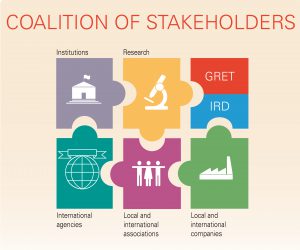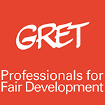Nutridev: 20 years of innovations to sustainably prevent malnutrition
In 1994, NGO GRET and some nutritionists at the French National Research Institute for Sustainable Development (IRD) created the Nutridev programme to fight against child malnutrition, in particular in its least visible form: stunting. They designed an innovative method to prevent malnutrition, aimed first and foremost at children under the age of two. 20 years later, the programme is working in ten developing countries, concerning 600,000 people.
Why the Nutridev programme?
Three million children under the age of 5 die every year from malnutrition. When malnutrition does not cause death, it leads to irreversible damage in adults (stunting, morbidity, physical and mental handicaps), that are passed on from one generation to the next, with significant consequences for the development of territories. In order to break the vicious malnutrition-illness-poverty circle, the Nutridev programme works on preventing malnutrition, giving priority to children under the age of two, women of childbearing age, pregnant or breastfeeding women, as well as pre-school and primary school-age children.
See the programme in video
“With Nutridev, GRET and the IRD created an innovative method based on 3 pillars: raising awareness on better nutrition practices, providing good quality, locally produced fortified foods at affordable prices, and improving healthcare services”, explains Mirrdyn Denizeau, head of the Nutridev programme with GRET. “This is the basis on which we roll out projects in various countries, adapting actions to suit contexts and searching for innovative solutions locally.”
More information on the method
20 years of actions generating concrete results
The Nutridev programme’s actions have generated sustainable results:
- 30 fortified foods put on the market in countries where there was no quality offer affordable for low-income families.
- Provision of support to 40 local businesses producing fortified foods.
- 1 social business fighting against malnutrition, Nutri’zaza, set up in Madagascar. “In 2016, we sold over 33,000 fortified porridge meals per day, including 7,000 via a network of restaurants for babies and mobile sales, and we employ approximately one hundred women”, explains Nutri’zaza director, Mieja Vola Rakotonarivo.
- National and local policies incorporating the lessons learned from the programme: national nutrition strategies (Madagascar, Vietnam), toolkits for awareness-raising (Burkina Faso, Guinea), a quality standard for fortified infant flours in Burkina Faso, etc.
- Innovative systems: door-to-door marketing, provision of fortified products in school settings, integration of information and communication technologies, innovative nutritional safety nets, links between agriculture and nutrition, etc.
The origins of the programme

The programme defends three main principles:
- combining research and action to find suitable solutions for each context;
- working in coalitions of stakeholders from the academic, political, economic and association arenas;
- making actions sustainable and part of public policies.
To understand where these three principles come from, one must return to the origins of the programme and its founders. In 1994, two professionals from GRET and Orstom (now the IRD), Jacques Monvois and Serge Trèche, combined their skills as researcher and operator fighting malnutrition: this is how the action-research approach has been created. Chantal Monvois supported the initiative by encouraging a sponsorship approach in her company (Sanofi): the private sector joined the initiative and the programme was generated by a coalition of stakeholders. For the last 20 years, the programme has focused on making its actions last over the long term via sharing of experiences, the publication of scientific articles, strengthening of local healthcare and nutrition stakeholders to continue actions over the long term, and contribution to public policies in France and in countries of intervention.
See the founders of the programme in video [in french only]




